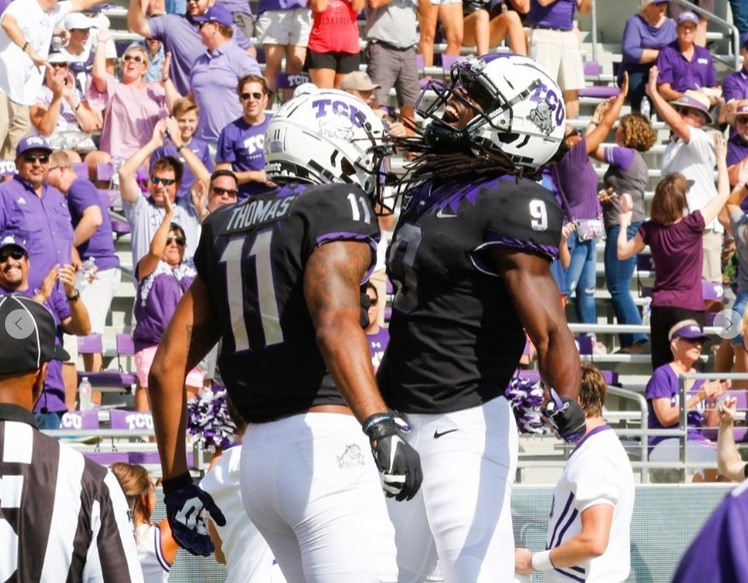Going up for a touchdown catch between two defenders illustrates the beauty of football. It’s one player defying the odds, unwilling to succumb even outnumbered.
Poetic, really.
It’s not hard to believe, then, that Dylan Thomas made such a play last week for TCU against Kansas. The junior wide receiver, who fittingly shares his name with the Welsh poet and author, tracked the ball perfectly and instinctively timed his move to claim it in the end zone, triggering the Horned Frogs’ 51-14 victory.
Do not go gentle into that good night, the poet wrote.
No, never. Never on a football field.

“You always appreciate it when your quarterback has some faith to give you a chance to make a play. And when it comes your way, you’ve just got to capitalize,” the wideout said after the game. “Any chance you get, you have to capitalize.”
This is Thomas’ chance. Fully healed from a hand injury that forced him to redshirt last season, the 6-foot-1, 199-pound receiver has made himself figure prominently in the Frogs’ offensive game plan.
His seven catches for 114 yards in the past two games include the 26-yard touchdown beauty against Kansas and a 30-yard catch against SMU. Downfield and across the middle, the Fort Worth Paschal High School product is an emerging option to balance production with No. 1 target Jalen Reagor.
“Honestly, I feel like we have a lot of guys who can fill that role,” Thomas said. “It’s just a matter of us getting those people the ball, and really, with a lot of eyes being on Reagor, it gives everyone else a chance to step up and be even that much better of a player.”
It’s never been hard to see Thomas’ talent. In high school, he once scored 14 touchdowns in just 3 1/2 games of a season cut short by injury. Playing quarterback, receiver, safety, kick returner — even holder — the multi-talented player caught TCU’s attention early, playing mere blocks away in Fort Worth.
“Schools came in to look at him, and it was an instant we-want-him,” said Matt Cook, Thomas’ coach at Paschal, himself a former TCU player. “What we were extremely happy about is that TCU came in; that’s where we all wanted him to go. We have an unbelievable TCU community at Paschal. So many of our parents went to TCU. So many in the community wanted him to go there — myself, my staff — it just made sense.”
Thomas’ career trajectory was making sense, too. As a freshman, he played in six games and caught three passes. As a sophomore, he played in all 14 games and caught nine passes, including a touchdown.
Last season, the story went off schedule because of a broken thumb suffered against Ohio State in a game where he had already made a head-turning 34-yard catch.
“It was extremely tough,” Thomas said. “But it’s honestly made me stronger mentally and made me a better leader to the group, being one of the older guys now, just a better leader to the group, not taking myself away from the program, still being around and helping the young guys basically learn plays, learn how to line up faster and just make everything go smooth.”
That does not surprise Cook, who held up Thomas as an example of unselfishness in high school.
“We weren’t loaded with talent, but he helped us get kids that weren’t normally going to play football because kids wanted to be around him,” Cook said. “If a kid thought he was going to just play receiver, we could say, ‘Well, look, Dylan’s playing both sides of the ball and special teams.’ So he was a true leader by example. We could say here’s our best athlete, and he’s working the hardest. He gave us clout when we were asking kids to do a little bit more than they thought they could.”
Stories of overcoming adversity are common in sports. They are timeless tales no matter the setting, honestly. Wordsmiths and playwrights have long been inspired by “the comeback,” in today’s parlance.
Rage, rage against the dying of the light, the poet wrote.
He could have been talking about football.
Thomas can see the connection. He remembers as a middle-schooler googling his name and learning all he could about its famous bearer, whose most famous works are the two untitled poems that begin with the lines “Do not go gentle into that good night” and “And death shall have no dominion.”
Both speak to the idea of struggle and immortality.
“I kind of just started reading through some of the stuff,” Thomas said.
He’s no poet, he adds. He leaves the writing to others. His work, for now, is on the football field.
“I’m into music,” he said. “I really let music help me with my mind and motivation. They say that’s a form of poetry.”
And they’re right.
(Photos by TCU Athletics)







